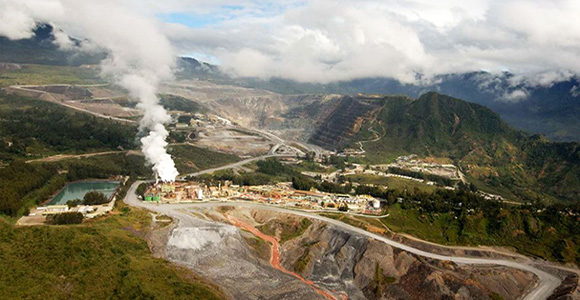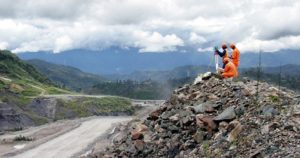Papua New Guinea’s government is coming under intense pressure to renegotiate the Special Mining Lease for the Porgera gold mine, which it refused to extend in April. Multiple industry bodies have urged the government to urgently negotiate with the mine’s joint venture operators, Barrick Gold and Zijin Mining, pointing to extreme economic stress.
When the Porgera lease was refused an extension in late April, the Marape-Steven government described the move as part of its strategy to ‘take back PNG’. However, since the announcement, a number of industry groups are urging the government to take a more pragmatic approach.

PNGCCI’s John Leahy
Protests against the decision are flooding in. The PNG Chamber of Commerce and Industry (PNGCCI) President John Leahy last week wrote to Prime Minister James Marape on behalf of eight business groups across Papua New Guinea noting the ‘very negative impact the decision has already had on PNG’s reputation as a safe investment destination’, and urging a reversal of the decision.
He cited several letters written him by regional business groups. A letter from the Madang Chamber of Commerce and Industry, said that, although the chamber supported, in principle, ‘improved sharing’ of rewards from mining, the impasse is not in the national interest.
‘The current closure will result in loss of employment for over 3000 employees and contractors with many more companies and people dependent on the economic and social benefits,’ the letter said.
It questioned the fairness of the decision, saying that the Government may be looking to nationalise a mine into which resource companies have ‘invested many billions’. It says the decision is already affecting the confidence of ‘existing and future investors who at this stage are vital to the economy’.
John Byrne, President of the Lae Chamber of Commerce, also wrote to the PNGCCI, saying that ‘the ripple effect through the PNG economy, across NGI, and through Central and outlier provinces’ is not to be underestimated.
‘We are all suffering economically and business has not been this bad for a long, long time. The Government needs to facilitate negotiations.’
‘Lae city is already feeling immediate consequences with several business houses laying off 50-plus people as a direct result of the impasse. In a market which is already under pressure from a constrained Government deficit, major shortages of foreign exchanges and now COVID-19, this is not a position that encourages investment or contributes to the well being of our citizens or business houses. We implore both parties to determine a mutually acceptable position.’
More chambers chime in
The Porgera Chamber of Commerce and Industry also weighed in. In its letter to the PNGCCI, it said that ‘the timing was not right’ and said the Government only ‘added fuel on to the burning fire’ with landowner issues, noting that 520 non-government organisations are fighting over Porgera legacy issues.
The Southern Highlands Province Chamber of Commerce and Industry said in its letter that the mine is a ‘massive economic hub’ for the communities in the area, Enga Province, Hela Province, Southern Highlands and the ‘people living along the Highlands Highway.’ It noted that the sudden shut down would affect ‘thousands of citizens and companies.’
The Milne Bay Chamber of Commerce and Industry questioned the government’s tactics. It noted that there is already an ‘investor sitting at the table willing to negotiate’.
‘We are all suffering economically and business has not been this bad for a long, long time. The Government needs to facilitate negotiations.’
‘The government should allow experienced companies to operate all mines and ensure that they are regularly audited so they pay all of the taxes that are due.’
The PNG Transport Association added its voice to the protests in a letter to Prime Minister Marape that said that, while there was agreement about the Government’s strategy ‘in principle’, all transport goods and services to Porgera have ceased. It named 10 companies that have been severely affected.
‘Operating a mine like Porgera requires a great deal of capital investment and it is a risky venture,’ Rio Fiocco, President of the Port Moresby Chamber of Commerce, noted in another letter. ‘The government should allow experienced companies to operate all mines and ensure that they are regularly audited so they pay all of the taxes that are due.’
Shifting positions
Both sides of the dispute are making moves. It is reported that Barrick Gold has offered an extra 15 per cent stake in the mine to local landowners, according to a letter from its Chief Executive, Mark Bristow. This offer, according to Bristow, would provide a total of 20 per cent equity ‘to be held by the PNG side including the 5 per cent currently owned.’
This leaves an apparent gap between the negotiating positions of the two parties. On 18 May, the Government appeared to move away from its refusal to extend the lease, announcing an offer negotiation of ’40 per cent equity in Porgera gold mine [to] Barrick Gold,’ with management rights subject to negotiations.
‘The PNG government wishes to hold back 60 per cent equity to be shared with the State, Landowners’ Provincial Governments and Districts in Enga Province,’ the statement said.
Meanwhile, legal proceedings between the State and the Barrick Joint Venture are reportedly due back in PNG’s National Court this Wednesday 3 June.











Speak Your Mind